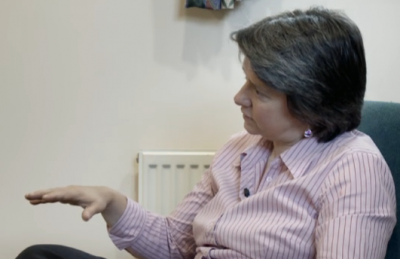
A few years ago the BBC ran a three-part series, The Big Silence, about a group of only-vaguely-religious people undergoing an individually-guided, Ignatian retreat at St Beuno’s Retreat House in North Wales. Though good viewing in and of itself it was undermined by a rather confused premiss: the programme tried to invite the participants into a discipline of silence in their busy daily lives as though silence was an end in itself. In some spiritualities that might be true but in the Ignatian way silence is only ever a means to an end: an encounter with the God who can be found in all things, silent or noisy. The ‘big silence’ of an Ignatian retreat should never be the focus it was portrayed to be.
So what is the silence of a retreat all about? Silence isn’t an idea that Ignatius used much. The term he used instead was ‘withdrawal’. He thought withdrawal from business and friends and other concerns made a space for God to be experienced clearly. The silence of a retreat house is to permit a temporary withdrawal from distractions.
Ignatian retreat houses like St Beuno’s offer silent retreats, ask visitors to respect the silence of others, serve most meals in silence. Why? Well, once they get a taste for silence, most people who stay there fall in love with it, yet many others never enter their gates at all because of the fear of silence. The BBC series showed both the importance of silence and how it can become a bugbear.
So what is silence for at a place like St Beuno’s? It is so visitors can hear–-can hear their own lives whispering to them and, in that sound, hear the voice of God.
To shift the metaphor, it’s as if we were each pools of slightly murky water: it doesn’t take much to stir up the sediment and lower the visibility. But if you let the pool settle, become still, all the gunk drifts down to the bottom and the water becomes crystal clear. And in that clarity, through that clarity, new visions open up: maybe prosaic glimpses (‘I really need more sleep!’); maybe profound insights (‘God sees everything about me with delight!’); maybe new possibilities (‘what about a different direction in life?’).
What does silence on retreat mean in practice? It is to permit withdrawal from distraction: most straightforwardly not talking unnecessarily and not distracting others by trying to chat with them but it has other implications too. It means letting yourself become more silent inside, pacing yourself, and slowing down. St Beuno’s plays some innocuous music at mealtimes so you don’t get too distracted by eating without conversation. It means turning your mobile phone off so that it doesn’t ring and disturb people. It means you avoid the radio, TV, newspapers, email etc. It means leaving aside the pile of books you’ve brought along for distraction.
None of these practices is meant to be hard and most of them are negotiable with your personal retreat guide. The aim is to let the background ‘noise’ fade to the point where other things can be noticed–like the bark on a tree, the way you feel about life, or the look in God’s ‘eyes’. Without the background silence you can be intrigued by something you encounter while praying with a gospel story but forget it right afterwards. Or you can feel delighted (or sad, or moved, or challenged) by a memory that comes to you only to have it swamped by what someone says to you over the dinner table. The silence helps you stay with the gospel insight and hold the memory long enough to savour them, long enough for God to be found through them.
What takes the place of chatting, phoning, reading, and emailing? Well some time will be given over to praying and some in meeting with your retreat director. The rest might be spent walking, sitting in the garden, dabbling in the art room, listening to relaxing music, dozing, slowing down, doing some exercise, taking a sauna, or doing a jigsaw puzzle. The idea is to find a rhythm that allows you to be attentive, relaxed, and aware.
So, silence isn’t the be-all and end-all of retreat–in fact if it comes to be the focus of things it can be itself an obstacle–indeed silence isn’t desirable for its own sake. Some spiritualities do place an emphasis on silence as way of life but that has never been the Ignatian way. St. Ignatius believed that God could be found in all things–in fact wherever we find ourselves, as much in work or raising kids as in a monastery.
An old saying about the founders of religious orders says ‘Bernard loved the valleys, and Benedict loved the hills, Francis the towns, Ignatius the great cities.’ Ignatian spirituality is at home in the heart of everyday life, finding God there and finding God’s call us to each of us there.
That’s what silence is for–so that time apart can make it easier to find God in the noise and hullabaloo and ordinariness of life–and that is the ultimate measure of the worth of silence. The silence of a retreat isn’t meant to be carried home and squeezed into the busy gaps in life but the one who has, through a time of withdrawal and focus, encountered God can find that same God anywhere, no matter the noise.